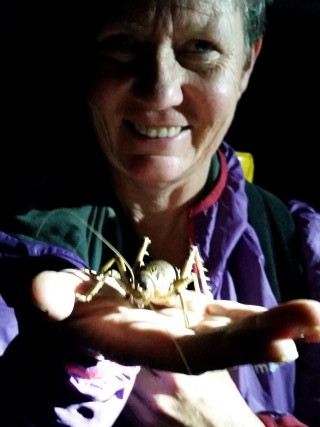Koraunui School - Dianne Christenson

2015 | The buzz? Are pesticides affecting our bees?
School: Koraunui School
Host: Victoria University of Wellington, School of Biological Sciences
Region: Wellington
Dianne currently works at Koraunui Primary in Stokes Valley, Lower Hutt. She is passionate about sharing the joys and wonders of the world of science and technology with children. She believes that being curious is a key attribute to be encouraged in our tamariki. Participating in the programme has allowed Dianne to model to her students, that she is also a learner.
Dianne was hosted by Professor Phil Lester at Victoria University in the School of Biological Sciences, (Te Kura Mātauranga Koiora). Professor Lester and his students are involved in studying population dynamics and ecology of social insects.
Dianne has spent her time learning about the ecology of invasive species. She has been able to work with bees, wasps and ants. She participated in a project with Gisborne beekeepers, attempting to discover the causes behind hive deaths in particular locations.She has a new appreciation for the complexity of scientific trials involving social insects. She discovered that it is extremely difficult to pin down a cause for the mortalities when there are so many variables.
While at the School of Biological Sciences, Dianne had many opportunities to see how science benefits the local community. Understanding the effects of pesticides on our bees is of huge importance to our developing manuka honey and pollination industries. Understanding the food requirements of bees is also of major importance to our agricultural industries. Dianne has been fortunate to work with beekeepers and scientists who are involved in developing the “Trees for Bees” project. This is something she is keen to introduce to her school. She has also seen how invasive insects can have enormous impacts on both people and native species. In New Zealand, German and Common Wasps are particular problems, as are Argentine Ants. In the Pacific, Yellow Crazy Ants and Little Fire Ants cause major issues for people. Dianne has a new understanding of why New Zealand needs to maintain strict biosecurity measures at our borders.
Dianne also participated in more general research. Highlights included a native frog survey on Maud Island, learning to analyse pollen samples, attending botany lectures and developing a much deeper knowledge and understanding of beekeeping.
Other highlights included the opportunity to attend a week long residential leadership course at University of Otago and the six days of professional development in science with a focus on the Nature of Science – the learning from these days will be invaluable on her return to school.
Dianne is looking forward to sharing her science learning with the Koraunui teachers when she returns to school. She will work collaboratively with the staff to develop a school wide vision for science and will facilitate a programme of professional development for the teachers.
Dianne is excited to be bringing this knowledge back into school and is already planning to build on the professional relationships she has developed through the programme to enable students to get involved in citizen science projects where they will be making real contributions to their community.
